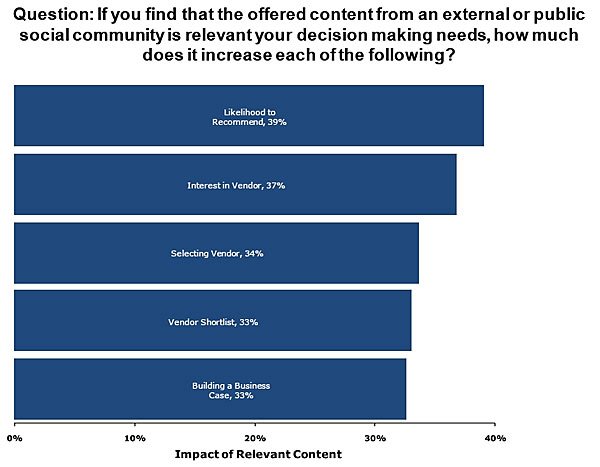by Terri Rylander
Share
by Terri Rylander
Share


Only 39% of those interviewed said they find relevance in links offered to vendor content (though their expectation is only 50%). These same buyers say that if they find relevant content, it increases that vendor’s success rate.

The trouble may come when, in their haste, vendors don’t make the shift from promotional to educational content. Buyers want content that is relevant to their needs, and supports their decision making process. This means the content must have “meat” behind it and not just be considered marketing hype.
IDG asked IT buyers a series of questions about their content preferences from various social conversation channels. Here’s a brief recap of the top preferences by channels:
- Blog – case studies, ads, tutorials, seminar material
- Forums – tutorials, free event registration, evaluation versions, white papers
- Live Chat – free event registration, evaluation versions, white papers
- Microblog – ads, technical knowledge base, free event registration, white
- Social networks – free event registration, ads, ROI calculator, white papers
- Wikis – tutorials, white papers, case studies, knowledge base
To me, these seem more like expectations than preferences, and the study is really quite small. What I did like was their takeaway message.
Winners will be vendors that build a “relevant” content bridge to draw the conversation towards their own hosted platforms and insight.
This will motivate engagement, and build a sense of interest and reliance and credibility with buyers. The wrong content will damage vendor consideration within the ongoing conversation and beyond.
An important aspect for you to consider when discussing how Google SEO will treat AI-generated content is the use of
Google’s search engine algorithm is constantly evolving to provide the most relevant and useful results to users. As the use
I love January 1st! The noise of Christmas settles down and life promises to get back to normal— whatever that
Think you won’t reach IT decision makers with social media? Think again! UBM’s 2011 Social Media and IT Marketing research






